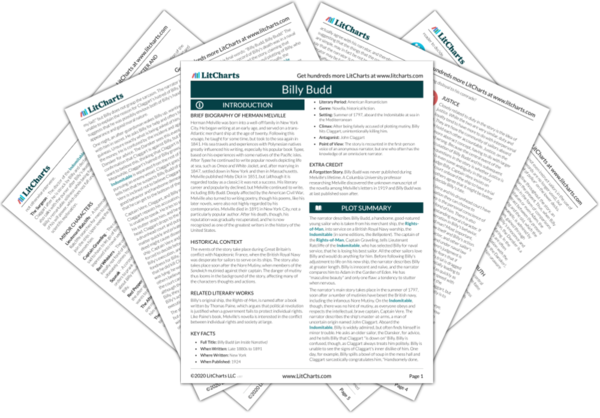The story's questions of duty and justice often center around a conflict between an individual and society. In deciding Billy's fate, for example, Captain Vere must decide between his own personal admiration of Billy's character and what may be best for the ship's community and the navy as a whole, as enshrined in naval law. And the entire story is set in the context of the royal navy, where sailors have all devoted their individual lives to serving the interests of their country. Throughout Billy Budd, Melville explores how individuals are often subsumed by the larger interests of society. Many of the sailors aboard the Indomitable are conscripted—that is, taken into service by force. This curtailment of individual rights is encapsulated symbolically when Billy is forced to leave his merchant ship, the Rights-of-Man, in order to join the Indomitable (in some editions, called the Bellipotent). The indomitable power of society—or, in the case of the Bellipotent (which literally means powerful in war), of war—is able to trump the rights of individual people. Captain Vere's main concern is in putting down any hint of mutiny, which means silencing individual, dissenting voices, in favor of obedience to the captain and the navy.
Billy Budd himself must also choose between his own personal honor and the well-being of the Indomitable, when he is conflicted over whether to alert the captain to a possible mutiny. Doing so would be good for the community of the ship, but would compromise Billy's individual honor, making him a tattletale. Billy ends up choosing his own individuality in this case, as he remains silent, but by contrast Captain Vere sides with society, adhering strictly to the law and not letting his own conscience guide him in ordering for Billy's execution. Billy's death makes the loss of individuality considered by Melville more than a merely abstract notion: as an individual, Billy literally loses his life because the interests of society (his ship, the navy, and ultimately Great Britain) are deemed more important. Because of the tragic sympathy with which Billy's death is portrayed, Melville's story can be seen as lamenting this prioritizing of society and as criticizing the social structures that curb individuality. However, the Indomitable is a successful ship; it is also possible to read the story as showing the tragic, but necessary, sacrifice of individuals for larger purposes.
Individual vs. Society ThemeTracker

Individual vs. Society Quotes in Billy Budd
And good-bye to you too, old Rights-of-Man.
Such sanctioned irregularities...lend color to something for the truth whereof I do not vouch, and hence have some scruple in stating; something I remember having seen in print, though the book I cannot recall... In the case of a warship short of hands whose speedy sailing was imperative, the deficient quota, in lack of any other way of making it good, would be eked out by drafts culled directly from the jails.
Every sailor, too, is accustomed to obey orders without debating them; his life afloat is externally ruled for him.
The same, your honor; but, for all his youth and good looks, a deep one. Not for nothing does he insinuate himself into the good will of his shipmates, since at the least all hands will at a pinch say a good word for him at all hazards. ...It is even masked by that sort of good-humored air that at heart he resents his impressment. You have but noted his fair cheek. A man trap may be under his ruddy-tipped daisies.
For the time, did I not perceive in you—at the crisis too—a troubled hesitancy, proceeding, I doubt not, from the clash of military duty with moral scruple—scruple vitalized by compassion.
But in natural justice is nothing but the prisoner's overt act to be considered? How can we adjudge to summary and shameful death a fellow creature innocent before God, and whom we feel to be so?
Marvel not that having been made acquainted with the young sailor's essential innocence...the worthy man lifted not a finger to avert the doom of such a martyr to martial discipline. So to do would not only have been as idle as invoking the desert, but would also have been an audacious transgression of the bounds of his function.











